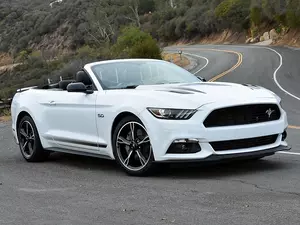
| Vehicle | Curb weight | Difference from world's smallest | Weight to power ratio | 0—60 mph acceleration ratio | Consumption ratio |
|---|---|---|---|---|---|
| Shelby GT350 R 5.2 V8 |
1661 kg / 3663 lbs |
1236 kg (2726 lbs) heavier | 3 kg to 1 hp | - |
113 kg/L (249 lbs/L) |
| GT 5.0 Ti-VCT V8 |
1681 kg / 3707 lbs |
1256 kg (2770 lbs) heavier | 4 kg to 1 hp | - |
129 kg/L (284 lbs/L) |
| 2.3 GTDi EcoBoost |
1607 kg / 3543 lbs |
1182 kg (2606 lbs) heavier | 5 kg to 1 hp | - |
171 kg/L (377 lbs/L) |
| Shelby GT350 5.2 V8 |
1706 kg / 3762 lbs |
1281 kg (2825 lbs) heavier | 3 kg to 1 hp | - |
116 kg/L (256 lbs/L) |
| BULLITT 5.0 Ti-VCT V8 |
1746 kg / 3850 lbs |
1321 kg (2913 lbs) heavier | 4 kg to 1 hp | - |
133 kg/L (293 lbs/L) |
| Vehicle | Shelby GT350 R 5.2 V8 |
|---|---|
| Curb weight |
1661 kg / 3663 lbs |
| Difference from world's smallest | 1236 kg (1236 lbs) heavier |
| Weight to power ratio | 3 kg to 1 hp |
| 0—60 mph acceleration ratio | - |
| Consumption ratio |
113 kg/L (249 lbs/L) |
| Vehicle | GT 5.0 Ti-VCT V8 |
| Curb weight |
1681 kg / 3707 lbs |
| Difference from world's smallest | 1256 kg (1256 lbs) heavier |
| Weight to power ratio | 4 kg to 1 hp |
| 0—60 mph acceleration ratio | - |
| Consumption ratio |
129 kg/L (284 lbs/L) |
| Vehicle | 2.3 GTDi EcoBoost |
| Curb weight |
1607 kg / 3543 lbs |
| Difference from world's smallest | 1182 kg (1182 lbs) heavier |
| Weight to power ratio | 5 kg to 1 hp |
| 0—60 mph acceleration ratio | - |
| Consumption ratio |
171 kg/L (377 lbs/L) |
| Vehicle | Shelby GT350 5.2 V8 |
| Curb weight |
1706 kg / 3762 lbs |
| Difference from world's smallest | 1281 kg (1281 lbs) heavier |
| Weight to power ratio | 3 kg to 1 hp |
| 0—60 mph acceleration ratio | - |
| Consumption ratio |
116 kg/L (256 lbs/L) |
| Vehicle | BULLITT 5.0 Ti-VCT V8 |
| Curb weight |
1746 kg / 3850 lbs |
| Difference from world's smallest | 1321 kg (1321 lbs) heavier |
| Weight to power ratio | 4 kg to 1 hp |
| 0—60 mph acceleration ratio | - |
| Consumption ratio |
133 kg/L (293 lbs/L) |

| Vehicle | Curb weight | Difference from world's smallest | Weight to power ratio | 0—60 mph acceleration ratio | Consumption ratio |
|---|---|---|---|---|---|
| GT 5.0 Ti-VCT V8 |
1765 kg / 3892 lbs |
1340 kg (2955 lbs) heavier | 4 kg to 1 hp | - |
136 kg/L (300 lbs/L) |
| 2.3 GTDi EcoBoost |
1684 kg / 3713 lbs |
1259 kg (2776 lbs) heavier | 5 kg to 1 hp | - |
179 kg/L (395 lbs/L) |
| Vehicle | GT 5.0 Ti-VCT V8 |
|---|---|
| Curb weight |
1765 kg / 3892 lbs |
| Difference from world's smallest | 1340 kg (1340 lbs) heavier |
| Weight to power ratio | 4 kg to 1 hp |
| 0—60 mph acceleration ratio | - |
| Consumption ratio |
136 kg/L (300 lbs/L) |
| Vehicle | 2.3 GTDi EcoBoost |
| Curb weight |
1684 kg / 3713 lbs |
| Difference from world's smallest | 1259 kg (1259 lbs) heavier |
| Weight to power ratio | 5 kg to 1 hp |
| 0—60 mph acceleration ratio | - |
| Consumption ratio |
179 kg/L (395 lbs/L) |

| Vehicle | Curb weight | Difference from world's smallest | Weight to power ratio | 0—60 mph acceleration ratio | Consumption ratio |
|---|---|---|---|---|---|
| 2.3 EcoBoost |
1653 kg / 3645 lbs |
1228 kg (2708 lbs) heavier | 5 kg to 1 hp | - |
169 kg/L (373 lbs/L) |
| GT 5.0 Ti-VCT V8 |
1732 kg / 3819 lbs |
1307 kg (2882 lbs) heavier | 4 kg to 1 hp | - |
144 kg/L (318 lbs/L) |
| GT 5.0 V8 |
1681 kg / 3707 lbs |
1256 kg (2770 lbs) heavier | 4 kg to 1 hp | - |
136 kg/L (300 lbs/L) |
| 3.7 V6 |
1599 kg / 3526 lbs |
1174 kg (2589 lbs) heavier | 5 kg to 1 hp | - |
143 kg/L (315 lbs/L) |
| Vehicle | 2.3 EcoBoost |
|---|---|
| Curb weight |
1653 kg / 3645 lbs |
| Difference from world's smallest | 1228 kg (1228 lbs) heavier |
| Weight to power ratio | 5 kg to 1 hp |
| 0—60 mph acceleration ratio | - |
| Consumption ratio |
169 kg/L (373 lbs/L) |
| Vehicle | GT 5.0 Ti-VCT V8 |
| Curb weight |
1732 kg / 3819 lbs |
| Difference from world's smallest | 1307 kg (1307 lbs) heavier |
| Weight to power ratio | 4 kg to 1 hp |
| 0—60 mph acceleration ratio | - |
| Consumption ratio |
144 kg/L (318 lbs/L) |
| Vehicle | GT 5.0 V8 |
| Curb weight |
1681 kg / 3707 lbs |
| Difference from world's smallest | 1256 kg (1256 lbs) heavier |
| Weight to power ratio | 4 kg to 1 hp |
| 0—60 mph acceleration ratio | - |
| Consumption ratio |
136 kg/L (300 lbs/L) |
| Vehicle | 3.7 V6 |
| Curb weight |
1599 kg / 3526 lbs |
| Difference from world's smallest | 1174 kg (1174 lbs) heavier |
| Weight to power ratio | 5 kg to 1 hp |
| 0—60 mph acceleration ratio | - |
| Consumption ratio |
143 kg/L (315 lbs/L) |

| Vehicle | Curb weight | Difference from world's smallest | Weight to power ratio | 0—60 mph acceleration ratio | Consumption ratio |
|---|---|---|---|---|---|
| GT 5.0 Ti-VCT V8 |
1792 kg / 3951 lbs |
1367 kg (3014 lbs) heavier | 4 kg to 1 hp | - |
140 kg/L (309 lbs/L) |
| 2.3 EcoBoost |
1718 kg / 3788 lbs |
1293 kg (2851 lbs) heavier | 5 kg to 1 hp | - |
175 kg/L (386 lbs/L) |
| Vehicle | GT 5.0 Ti-VCT V8 |
|---|---|
| Curb weight |
1792 kg / 3951 lbs |
| Difference from world's smallest | 1367 kg (1367 lbs) heavier |
| Weight to power ratio | 4 kg to 1 hp |
| 0—60 mph acceleration ratio | - |
| Consumption ratio |
140 kg/L (309 lbs/L) |
| Vehicle | 2.3 EcoBoost |
| Curb weight |
1718 kg / 3788 lbs |
| Difference from world's smallest | 1293 kg (1293 lbs) heavier |
| Weight to power ratio | 5 kg to 1 hp |
| 0—60 mph acceleration ratio | - |
| Consumption ratio |
175 kg/L (386 lbs/L) |

| Vehicle | Curb weight | Difference from world's smallest | Weight to power ratio | 0—60 mph acceleration ratio | Consumption ratio |
|---|---|---|---|---|---|
| 4.0 i V6 12V |
1625 kg / 3583 lbs |
1200 kg (2646 lbs) heavier | 8 kg to 1 hp | 243 kg/s (536 lbs/s) | - |
| 4.6 i V8 24V |
1685 kg / 3715 lbs |
1260 kg (2778 lbs) heavier | 6 kg to 1 hp | 337 kg/s (743 lbs/s) | - |
| Vehicle | 4.0 i V6 12V |
|---|---|
| Curb weight |
1625 kg / 3583 lbs |
| Difference from world's smallest | 1200 kg (1200 lbs) heavier |
| Weight to power ratio | 8 kg to 1 hp |
| 0—60 mph acceleration ratio | 243 kg/s (536 lbs/s) |
| Consumption ratio | - |
| Vehicle | 4.6 i V8 24V |
| Curb weight |
1685 kg / 3715 lbs |
| Difference from world's smallest | 1260 kg (1260 lbs) heavier |
| Weight to power ratio | 6 kg to 1 hp |
| 0—60 mph acceleration ratio | 337 kg/s (743 lbs/s) |
| Consumption ratio | - |

| Vehicle | Curb weight | Difference from world's smallest | Weight to power ratio | 0—60 mph acceleration ratio | Consumption ratio |
|---|---|---|---|---|---|
| 4.0i V6 12V |
1530 kg / 3374 lbs |
1105 kg (2437 lbs) heavier | 7 kg to 1 hp | 228 kg/s (503 lbs/s) | - |
| 4.0i V6 |
1495 kg / 3296 lbs |
1070 kg (2359 lbs) heavier | 7 kg to 1 hp | - | - |
| GT 4.6i V8 |
1565 kg / 3451 lbs |
1140 kg (2514 lbs) heavier | 5 kg to 1 hp | - |
101 kg/L (223 lbs/L) |
| Vehicle | 4.0i V6 12V |
|---|---|
| Curb weight |
1530 kg / 3374 lbs |
| Difference from world's smallest | 1105 kg (1105 lbs) heavier |
| Weight to power ratio | 7 kg to 1 hp |
| 0—60 mph acceleration ratio | 228 kg/s (503 lbs/s) |
| Consumption ratio | - |
| Vehicle | 4.0i V6 |
| Curb weight |
1495 kg / 3296 lbs |
| Difference from world's smallest | 1070 kg (1070 lbs) heavier |
| Weight to power ratio | 7 kg to 1 hp |
| 0—60 mph acceleration ratio | - |
| Consumption ratio | - |
| Vehicle | GT 4.6i V8 |
| Curb weight |
1565 kg / 3451 lbs |
| Difference from world's smallest | 1140 kg (1140 lbs) heavier |
| Weight to power ratio | 5 kg to 1 hp |
| 0—60 mph acceleration ratio | - |
| Consumption ratio |
101 kg/L (223 lbs/L) |

| Vehicle | Curb weight | Difference from world's smallest | Weight to power ratio | 0—60 mph acceleration ratio | Consumption ratio |
|---|---|---|---|---|---|
| 3.8 V6 |
1390 kg / 3065 lbs |
965 kg (2128 lbs) heavier | 7 kg to 1 hp | 207 kg/s (456 lbs/s) | - |
| 4.6i V8 32V Mach I |
1602 kg / 3532 lbs |
1177 kg (2595 lbs) heavier | 5 kg to 1 hp | - | - |
| 4.6 V8 32V Cobra |
1525 kg / 3363 lbs |
1100 kg (2426 lbs) heavier | 5 kg to 1 hp | 293 kg/s (646 lbs/s) | - |
| 4.6 i V8 32V Cobra R |
1665 kg / 3671 lbs |
1240 kg (2734 lbs) heavier | 4 kg to 1 hp | 354 kg/s (781 lbs/s) | - |
| 4.6 V8 Cobra |
1545 kg / 3407 lbs |
1120 kg (2470 lbs) heavier | 5 kg to 1 hp | - |
137 kg/L (302 lbs/L) |
| 4.6 V8 GT |
1530 kg / 3374 lbs |
1105 kg (2437 lbs) heavier | 6 kg to 1 hp | 294 kg/s (648 lbs/s) | - |
| 5.0 GT |
1486 kg / 3277 lbs |
1061 kg (2340 lbs) heavier | 7 kg to 1 hp | - | - |
| Vehicle | 3.8 V6 |
|---|---|
| Curb weight |
1390 kg / 3065 lbs |
| Difference from world's smallest | 965 kg (965 lbs) heavier |
| Weight to power ratio | 7 kg to 1 hp |
| 0—60 mph acceleration ratio | 207 kg/s (456 lbs/s) |
| Consumption ratio | - |
| Vehicle | 4.6i V8 32V Mach I |
| Curb weight |
1602 kg / 3532 lbs |
| Difference from world's smallest | 1177 kg (1177 lbs) heavier |
| Weight to power ratio | 5 kg to 1 hp |
| 0—60 mph acceleration ratio | - |
| Consumption ratio | - |
| Vehicle | 4.6 V8 32V Cobra |
| Curb weight |
1525 kg / 3363 lbs |
| Difference from world's smallest | 1100 kg (1100 lbs) heavier |
| Weight to power ratio | 5 kg to 1 hp |
| 0—60 mph acceleration ratio | 293 kg/s (646 lbs/s) |
| Consumption ratio | - |
| Vehicle | 4.6 i V8 32V Cobra R |
| Curb weight |
1665 kg / 3671 lbs |
| Difference from world's smallest | 1240 kg (1240 lbs) heavier |
| Weight to power ratio | 4 kg to 1 hp |
| 0—60 mph acceleration ratio | 354 kg/s (781 lbs/s) |
| Consumption ratio | - |
| Vehicle | 4.6 V8 Cobra |
| Curb weight |
1545 kg / 3407 lbs |
| Difference from world's smallest | 1120 kg (1120 lbs) heavier |
| Weight to power ratio | 5 kg to 1 hp |
| 0—60 mph acceleration ratio | - |
| Consumption ratio |
137 kg/L (302 lbs/L) |
| Vehicle | 4.6 V8 GT |
| Curb weight |
1530 kg / 3374 lbs |
| Difference from world's smallest | 1105 kg (1105 lbs) heavier |
| Weight to power ratio | 6 kg to 1 hp |
| 0—60 mph acceleration ratio | 294 kg/s (648 lbs/s) |
| Consumption ratio | - |
| Vehicle | 5.0 GT |
| Curb weight |
1486 kg / 3277 lbs |
| Difference from world's smallest | 1061 kg (1061 lbs) heavier |
| Weight to power ratio | 7 kg to 1 hp |
| 0—60 mph acceleration ratio | - |
| Consumption ratio | - |

| Vehicle | Curb weight | Difference from world's smallest | Weight to power ratio | 0—60 mph acceleration ratio | Consumption ratio |
|---|---|---|---|---|---|
| 3.8 V6 |
1455 kg / 3208 lbs |
1030 kg (2271 lbs) heavier | 8 kg to 1 hp | - | - |
| 4.6 i V8 32V Cobra R |
1745 kg / 3848 lbs |
1320 kg (2911 lbs) heavier | 4 kg to 1 hp | - | - |
| 4.6 V8 32V Cobra |
1615 kg / 3561 lbs |
1190 kg (2624 lbs) heavier | 5 kg to 1 hp | 311 kg/s (686 lbs/s) | - |
| 3.8 V6 GT |
1455 kg / 3208 lbs |
1030 kg (2271 lbs) heavier | 10 kg to 1 hp | - | - |
| 4.6 V8 GT |
1550 kg / 3418 lbs |
1125 kg (2481 lbs) heavier | 6 kg to 1 hp | 298 kg/s (657 lbs/s) | - |
| 5.0 GT |
1566 kg / 3453 lbs |
1141 kg (2516 lbs) heavier | 7 kg to 1 hp | - | - |
| Vehicle | 3.8 V6 |
|---|---|
| Curb weight |
1455 kg / 3208 lbs |
| Difference from world's smallest | 1030 kg (1030 lbs) heavier |
| Weight to power ratio | 8 kg to 1 hp |
| 0—60 mph acceleration ratio | - |
| Consumption ratio | - |
| Vehicle | 4.6 i V8 32V Cobra R |
| Curb weight |
1745 kg / 3848 lbs |
| Difference from world's smallest | 1320 kg (1320 lbs) heavier |
| Weight to power ratio | 4 kg to 1 hp |
| 0—60 mph acceleration ratio | - |
| Consumption ratio | - |
| Vehicle | 4.6 V8 32V Cobra |
| Curb weight |
1615 kg / 3561 lbs |
| Difference from world's smallest | 1190 kg (1190 lbs) heavier |
| Weight to power ratio | 5 kg to 1 hp |
| 0—60 mph acceleration ratio | 311 kg/s (686 lbs/s) |
| Consumption ratio | - |
| Vehicle | 3.8 V6 GT |
| Curb weight |
1455 kg / 3208 lbs |
| Difference from world's smallest | 1030 kg (1030 lbs) heavier |
| Weight to power ratio | 10 kg to 1 hp |
| 0—60 mph acceleration ratio | - |
| Consumption ratio | - |
| Vehicle | 4.6 V8 GT |
| Curb weight |
1550 kg / 3418 lbs |
| Difference from world's smallest | 1125 kg (1125 lbs) heavier |
| Weight to power ratio | 6 kg to 1 hp |
| 0—60 mph acceleration ratio | 298 kg/s (657 lbs/s) |
| Consumption ratio | - |
| Vehicle | 5.0 GT |
| Curb weight |
1566 kg / 3453 lbs |
| Difference from world's smallest | 1141 kg (1141 lbs) heavier |
| Weight to power ratio | 7 kg to 1 hp |
| 0—60 mph acceleration ratio | - |
| Consumption ratio | - |

| Vehicle | Curb weight | Difference from world's smallest | Weight to power ratio | 0—60 mph acceleration ratio | Consumption ratio |
|---|---|---|---|---|---|
| 2.3i |
1340 kg / 2955 lbs |
915 kg (2018 lbs) heavier | 13 kg to 1 hp | - | - |
| 4.9 V8 |
1380 kg / 3043 lbs |
955 kg (2106 lbs) heavier | 6 kg to 1 hp | - | - |
| Vehicle | 2.3i |
|---|---|
| Curb weight |
1340 kg / 2955 lbs |
| Difference from world's smallest | 915 kg (915 lbs) heavier |
| Weight to power ratio | 13 kg to 1 hp |
| 0—60 mph acceleration ratio | - |
| Consumption ratio | - |
| Vehicle | 4.9 V8 |
| Curb weight |
1380 kg / 3043 lbs |
| Difference from world's smallest | 955 kg (955 lbs) heavier |
| Weight to power ratio | 6 kg to 1 hp |
| 0—60 mph acceleration ratio | - |
| Consumption ratio | - |

| Vehicle | Curb weight | Difference from world's smallest | Weight to power ratio | 0—60 mph acceleration ratio | Consumption ratio |
|---|---|---|---|---|---|
| 4.9 V8 |
1380 kg / 3043 lbs |
955 kg (2106 lbs) heavier | 6 kg to 1 hp | - | - |
| 2.3i |
1250 kg / 2756 lbs |
825 kg (1819 lbs) heavier | 12 kg to 1 hp | - | - |
| Vehicle | 4.9 V8 |
|---|---|
| Curb weight |
1380 kg / 3043 lbs |
| Difference from world's smallest | 955 kg (955 lbs) heavier |
| Weight to power ratio | 6 kg to 1 hp |
| 0—60 mph acceleration ratio | - |
| Consumption ratio | - |
| Vehicle | 2.3i |
| Curb weight |
1250 kg / 2756 lbs |
| Difference from world's smallest | 825 kg (825 lbs) heavier |
| Weight to power ratio | 12 kg to 1 hp |
| 0—60 mph acceleration ratio | - |
| Consumption ratio | - |